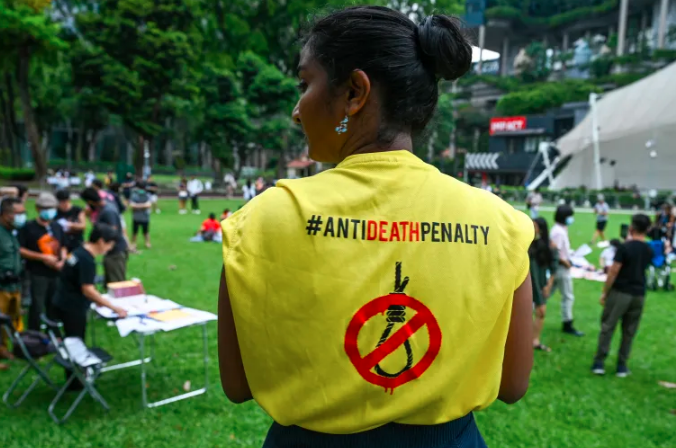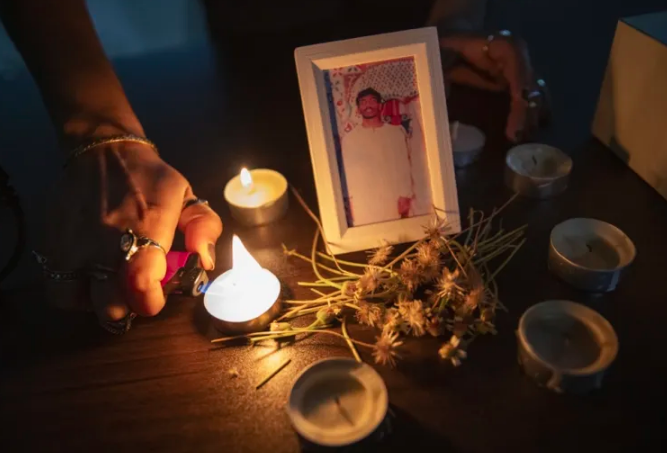The number of executions in Singapore has been rising fast. This has caused a big outcry around the world. People are upset because Singapore is very strict on the death penalty.
Many see the death penalty as a harsh rule. Human rights groups and international organizations want to change this. They think it’s time to rethink the death penalty.
For families, the death penalty is a harsh reality. They lose loved ones because of strict laws. These families are in great pain, hoping for mercy.
They want to see their sons, daughters, and partners again. The loss is very hard for them. It shows the human cost of a strict justice system.

The government of Singapore is still supporting the death penalty. They say it’s needed to fight drug trafficking. But, more and more people are asking for a change.
Civil society groups, legal experts, and human rights organizations are speaking out. They want a kinder approach to justice. Their voices are getting louder and harder to ignore.
Keep Reading:
US Unveils $500M Military Aid Package for Ukraine
Recent Surge in Capital Punishment Cases in Singapore
Singapore’s judicial system has seen a worrying rise in capital punishment cases. This trend has led to heated debates in law enforcement and criminal justice reform. Official data shows a sharp increase in executions, raising questions about justice fairness.
Experts say the surge is due to Singapore’s tough stance on drug trafficking. This strict policy has led to more people facing death, especially from marginalized groups. International human rights groups are worried about possible injustices and unfair impacts on vulnerable people.
The rise in capital punishment cases calls for a deep review of Singapore’s justice system. Reform advocates argue that the mandatory death penalty is not an effective deterrent. They suggest a shift towards rehabilitation, restorative justice, and addressing criminal behavior’s causes.
Understanding Singapore’s Mandatory Death Penalty Laws
Singapore’s judicial system has a unique approach to capital punishment, especially for drug trafficking. The country’s mandatory death penalty laws are among the strictest globally. They reflect Singapore’s firm stance against drug-related crimes.
These laws require a death sentence for those convicted of trafficking certain drugs like heroin, cocaine, and methamphetamine. The rationale behind these strict measures is rooted in Singapore’s belief that drug trafficking is a grave threat. The government sees the death penalty as a necessary deterrent to curb illegal drugs.
Critics argue that Singapore’s capital punishment laws lack flexibility and fail to consider individual circumstances. However, the government believes the mandatory nature of these laws ensures consistency and fairness. They think any discretion in sentencing could lead to inconsistencies and undermine the deterrent effect of the death penalty.

The impact of these laws is significant, leading to many executions in Singapore, especially for drug-related offenses. The issue of capital punishment is a contentious and emotive topic. Debates continue about its effectiveness, morality, and adherence to international human rights standards.
Drug Trafficking and Capital Punishment Connection
The link between drug trafficking and capital punishment in Singapore is complex. The government sees drug crimes as a big threat to safety and security. So, they have strict laws that can lead to death for some drug crimes.
Law enforcement in Singapore is tough on drug trafficking. They work with other countries to stop drugs and catch criminals. Judges also give death sentences to those found guilty of drug crimes.
But, many human rights groups and civil society organizations disagree. They say the death penalty for drugs is a human rights issue. They want a kinder approach to drug problems.

The argument over drug laws and capital punishment in Singapore shows a big problem. It’s about balancing public safety and human rights. Policymakers must find a way to keep the law while being fair and respecting human rights.
Growing Civil Society Opposition to Executions
In recent years, civil society groups in Singapore have led a movement against the death penalty. These activists are dedicated to human rights and fight to end capital punishment. Groups like the Singapore Anti-Death Penalty Campaign and We Believe in Second Chances have worked hard to raise awareness and push for change.
The families of those on death row are also key players in this fight. Losing a loved one to execution is incredibly hard. Yet, they share their stories, hoping to change public opinion and the government’s stance on capital punishment. “People start to care deeply,” says one mother who lost her son, “Trying to silence us, but we won’t stop.”
These efforts have caught the government’s attention. Singapore’s government is facing growing pressure to listen to these groups and rethink the death penalty. The battle between the state and activists shows how complex and sensitive this issue is. Both sides are working to shape Singapore’s criminal justice system’s future.
Singapore steps up executions and pressure on anti-death penalty
Singapore is known for its strict laws. Recently, it has increased executions. This move has sparked a heated debate. Civil society groups and human rights advocates are speaking out against the death penalty.
Law enforcement in Singapore is watching those who oppose the death penalty closely. Activists who speak against the mandatory death penalty face pressure. The government uses the judicial system to silence critics, leading to legal troubles for some.
Singapore’s stance on capital punishment has caught the world’s attention. Human rights groups have criticized the government’s actions. They say it violates citizens’ rights and undermines justice. Families of those on death row are also suffering, facing emotional and legal challenges.

The debate over capital punishment in Singapore continues. The government remains firm, putting more pressure on those who oppose the death penalty. The future is uncertain, with big implications for Singapore’s human rights and global reputation.
International Human Rights Organizations’ Stance
International organizations are leading the fight against capital punishment in Singapore. Groups like Amnesty International are at the forefront. They push for the end of the death penalty in the city-state.
Amnesty International has spoken out against the recent increase in executions. They call it a “betrayal of human rights.” The group also points out how the death penalty hurts the poor more, showing it’s unfair.
Human Rights Watch is also active in this issue. They report on Singapore’s use of the death penalty. Their reports focus on how mandatory death penalty laws affect drug offenders.
These organizations don’t just criticize Singapore. They demand changes and a halt to all executions. Their work helps raise awareness and support for those fighting against the death penalty in Singapore.
Impact on Families of Death Row Inmates
The families of death row inmates in Singapore face huge emotional and social challenges. They live with the constant fear of losing a loved one. This trauma affects their lives deeply.
These families are often shunned and isolated. They feel helpless as they try to understand the complex criminal justice system. This makes their situation even harder.
When a family member is sentenced to death, it’s a huge blow. “People start to care deeply, but they’re trying to silence us,” says a family member. The pain of losing someone is made worse by the lack of public support.
These families also face financial struggles. The legal fights and costs can drain their savings. They are often shunned by society, making it hard to find support.
The fight for human rights and justice in Singapore is important. It’s not just about those on death row. It’s also about the families left behind. Their stories highlight the need for change in the criminal justice system.
Legal Appeals and Clemency Processes
In Singapore’s judicial system, death row inmates can appeal their sentences. The country’s criminal justice reform aims for fairness and transparency in appeals. Yet, challenges still exist.
Inmates can appeal to higher courts, like the Court of Appeal and the Privy Council in the UK. These courts offer a chance to present new evidence or challenge case procedures. However, winning an appeal is rare, with only a few cases leading to reduced sentences.
Death row inmates can also seek clemency from the President of Singapore. An advisory committee reviews their cases, then advises the President. This has given hope to some, with a few executions stayed or sentences reduced.
The fairness and openness of these processes are debated in Singapore. Supporters push for a more just system. Authorities say the current system protects the law and public safety.
Regional Comparison of Death Penalty Practices
The debate on capital punishment in Singapore is important to understand. Southeast Asia shows a wide range of views on the death penalty. Singapore has a strict rule of mandatory death sentences for some crimes, like drug trafficking. But other countries in the area have different rules.
In Indonesia, the government has been executing people, mainly for drug crimes. This move has been heavily criticized by human rights groups. They say the justice system is unfair and lacks transparency. On the other hand, Malaysia is moving to get rid of the death penalty. This shows a shift in the region towards rethinking capital punishment.
The Philippines has talked about bringing back the death penalty, especially under President Rodrigo Duterte. This shows how complex and changing the debate on capital punishment is in the area. Countries like Thailand and Vietnam still have the death penalty, but opinions on it vary.
Singapore stands out in this context because it strongly supports its death penalty laws. While others are changing their stance, Singapore remains firm. This makes people wonder if Singapore’s stance could influence its neighbors and the wider region on capital punishment.
Future of Capital Punishment in Singapore
Singapore is facing a big challenge with criminal justice reform. The future of capital punishment is a major concern. The government still supports the mandatory death penalty for drug crimes, but there’s growing opposition and international pressure for change.
The human rights community has always pushed for the death penalty’s abolition. They say it violates the right to life and hurts marginalized groups. Recently, groups like Amnesty International and Human Rights Watch have urged Singapore to stop executions and reduce death sentences.
Some legal experts and reform advocates in Singapore suggest new ways to handle serious crimes. They propose life imprisonment and restorative justice programs. These ideas aim to make the justice system more in line with human rights while keeping society safe.
The future of capital punishment in Singapore is uncertain. It will depend on balancing the government’s need for order with the demand for a fairer justice system. The debate is ongoing, and it’s unclear if Singapore will change its stance on the death penalty.
Reform Proposals and Alternative Approaches
The debate on Singapore’s mandatory death penalty laws is ongoing. Many are calling for criminal justice reform. They want a system that is more humane and effective.
One idea is to give judges more power in sentencing. This would allow them to consider each case’s unique circumstances. It could lead to more fair punishments for drug crimes.
Another proposal is to make legal aid more accessible. This would help death row inmates challenge their sentences. Reformers also want to improve how the justice system works. They aim to make it more transparent and accountable.






